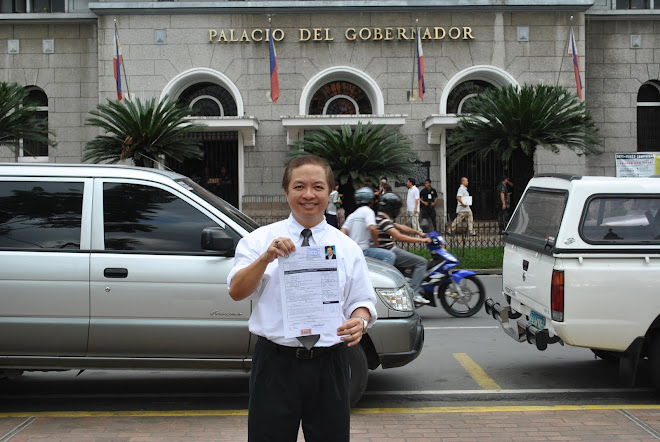Monday, January 18, 2010
'P1.5-trillion budget laden with pork'
By Jess Diaz (The Philippine Star)
MANILA, Philippines - The Congress-approved version of the P1.541-trillion 2010 national budget is “laden with pork,” an official of the Department of Budget and Management (DBM) involved in the review of the outlay said yesterday.
“It’s full of insertions made by senators and congressmen,” the official, who did not want to be named, told The STAR.
He said they would now make a detailed listing of congressional insertions, realignments, augmentations, and reductions.
Last Thursday, Gary Olivar, President Arroyo’s spokesman for economic issues, hinted that the President would slash the huge amount of “pork” in the budget.
He said Mrs. Arroyo is considering a veto on the P65-billion debt payment reduction that lawmakers have made and which they diverted to their pork barrel.
“She wants to continue exercising fiscal prudence and responsibility. She does not want to expand the budget deficit,” Olivar told a news forum in Quezon City.
“Because debt payments are automatically appropriated under the law, if you do not veto or reject the reduction in debt service funds, you will increase the deficit,” he said.
He added that the President has asked Budget Secretary Rolando Andaya Jr. to carefully review the final shape of the budget, particularly insertions made by lawmakers.
A bicameral conference committee chaired jointly by Senate finance committee chairman Edgardo Angara and his House counterpart Quirino Rep. Junie Cua drafted the final version of the budget. Malacañang received the two-inch thick 2010 appropriations bill last Wednesday, nearly a month after the Senate and the House approved the Angara-Cua committee report on Dec. 18.
It doesn’t usually take that long to print the budget document. What delayed the printing process was the job of hiding the lawmakers’ large pork barrel allocations all over the budget, which Cua’s staff was tasked to do. The staff closeted itself at the House’s Mitra building even during the Christmas holidays to finish embedding such allocations in the budgets of scores of agencies, primarily the Department of Public Works and Highways (DPWH).
The version that is presumably on Andaya’s desk now is vastly different from what the President submitted to Congress in August. The Angara-Cua panel reduced Mrs. Arroyo’s proposed debt payments by P65 billion to P276.2 billion and then farmed out the huge reduction to scores of agencies that hide pork barrel funds. Of the P65-billion cut, P30.3 billion was given to the DPWH, the agency where most lawmakers’ funds are hidden. The department’s budget jumped to P126.9 billion from P96.6 billion as proposed by the President.
Subsidies to state corporations were increased by P3.3 billion to P24.3 billion. Among the recipients is Angara’s two-year-old Aurora Special Economic Zone Authority (ASEZA), which received a huge P655-million augmentation. In her budget proposal, Mrs. Arroyo recommended only P145 million for ASEZA. The economic zone has barely taken off. Lawmakers also increased their Priority Development Assistance Fund (PDAF) by P3.9 billion to P10.9 billion.
‘Hidden’ pork
The PDAF is the source of money of senators and congressmen for their so-called “soft” projects such as medical, educational and livelihood assistance to constituents.
The fund is the only transparent pork barrel allocation in the budget in that it is so specified. Other pork barrel funds, intended for “hard” projects such as roads, are hidden in agency appropriations.
The public education sector received an additional P4.9 billion. The budget of the Department of Education was increased by P1.3 billion to P161.4 billion, while funds for the more than 100 state universities and colleges spread all over the country jumped by P2.8 billion to P22.4 billion.
During the House deliberations on Mrs. Arroyo’s budget proposal, Andaya said the President reduced the amount of money she proposed for DPWH for this year, compared to last year’s level, because the department still had tens of billions in backlog spending.
“There’s no use giving them additional money because they cannot spend it anyway,” he said.
He said unlike other appropriations, infrastructure funds are good for two years.
A congressman-supporter of Liberal Party presidential candidate Sen. Benigno Aquino III said Angara and Cua padded the DPWH budget with pork barrel allocations so that these funds would still be available to lawmakers in 2011 when a new president shall have taken over from Mrs. Arroyo.
“It is possible that Mrs. Arroyo will benefit from those funds if her successor will release them,” he said. The budget that Malacañang got from Congress last week is P400 million lower than Mrs. Arroyo’s proposal, but her allies did not cut her spending bill.
The P400 million represents the combined pork barrel funds for this year of Senators Panfilo Lacson and Jamby Madrigal, the only two lawmakers who do not avail themselves of their annual P200-million allocations. They make sure that their funds are deducted from the budget so they won’t be misused.
MANILA, Philippines - The Congress-approved version of the P1.541-trillion 2010 national budget is “laden with pork,” an official of the Department of Budget and Management (DBM) involved in the review of the outlay said yesterday.
“It’s full of insertions made by senators and congressmen,” the official, who did not want to be named, told The STAR.
He said they would now make a detailed listing of congressional insertions, realignments, augmentations, and reductions.
Last Thursday, Gary Olivar, President Arroyo’s spokesman for economic issues, hinted that the President would slash the huge amount of “pork” in the budget.
He said Mrs. Arroyo is considering a veto on the P65-billion debt payment reduction that lawmakers have made and which they diverted to their pork barrel.
“She wants to continue exercising fiscal prudence and responsibility. She does not want to expand the budget deficit,” Olivar told a news forum in Quezon City.
“Because debt payments are automatically appropriated under the law, if you do not veto or reject the reduction in debt service funds, you will increase the deficit,” he said.
He added that the President has asked Budget Secretary Rolando Andaya Jr. to carefully review the final shape of the budget, particularly insertions made by lawmakers.
A bicameral conference committee chaired jointly by Senate finance committee chairman Edgardo Angara and his House counterpart Quirino Rep. Junie Cua drafted the final version of the budget. Malacañang received the two-inch thick 2010 appropriations bill last Wednesday, nearly a month after the Senate and the House approved the Angara-Cua committee report on Dec. 18.
It doesn’t usually take that long to print the budget document. What delayed the printing process was the job of hiding the lawmakers’ large pork barrel allocations all over the budget, which Cua’s staff was tasked to do. The staff closeted itself at the House’s Mitra building even during the Christmas holidays to finish embedding such allocations in the budgets of scores of agencies, primarily the Department of Public Works and Highways (DPWH).
The version that is presumably on Andaya’s desk now is vastly different from what the President submitted to Congress in August. The Angara-Cua panel reduced Mrs. Arroyo’s proposed debt payments by P65 billion to P276.2 billion and then farmed out the huge reduction to scores of agencies that hide pork barrel funds. Of the P65-billion cut, P30.3 billion was given to the DPWH, the agency where most lawmakers’ funds are hidden. The department’s budget jumped to P126.9 billion from P96.6 billion as proposed by the President.
Subsidies to state corporations were increased by P3.3 billion to P24.3 billion. Among the recipients is Angara’s two-year-old Aurora Special Economic Zone Authority (ASEZA), which received a huge P655-million augmentation. In her budget proposal, Mrs. Arroyo recommended only P145 million for ASEZA. The economic zone has barely taken off. Lawmakers also increased their Priority Development Assistance Fund (PDAF) by P3.9 billion to P10.9 billion.
‘Hidden’ pork
The PDAF is the source of money of senators and congressmen for their so-called “soft” projects such as medical, educational and livelihood assistance to constituents.
The fund is the only transparent pork barrel allocation in the budget in that it is so specified. Other pork barrel funds, intended for “hard” projects such as roads, are hidden in agency appropriations.
The public education sector received an additional P4.9 billion. The budget of the Department of Education was increased by P1.3 billion to P161.4 billion, while funds for the more than 100 state universities and colleges spread all over the country jumped by P2.8 billion to P22.4 billion.
During the House deliberations on Mrs. Arroyo’s budget proposal, Andaya said the President reduced the amount of money she proposed for DPWH for this year, compared to last year’s level, because the department still had tens of billions in backlog spending.
“There’s no use giving them additional money because they cannot spend it anyway,” he said.
He said unlike other appropriations, infrastructure funds are good for two years.
A congressman-supporter of Liberal Party presidential candidate Sen. Benigno Aquino III said Angara and Cua padded the DPWH budget with pork barrel allocations so that these funds would still be available to lawmakers in 2011 when a new president shall have taken over from Mrs. Arroyo.
“It is possible that Mrs. Arroyo will benefit from those funds if her successor will release them,” he said. The budget that Malacañang got from Congress last week is P400 million lower than Mrs. Arroyo’s proposal, but her allies did not cut her spending bill.
The P400 million represents the combined pork barrel funds for this year of Senators Panfilo Lacson and Jamby Madrigal, the only two lawmakers who do not avail themselves of their annual P200-million allocations. They make sure that their funds are deducted from the budget so they won’t be misused.
Subscribe to:
Post Comments (Atom)










No comments:
Post a Comment